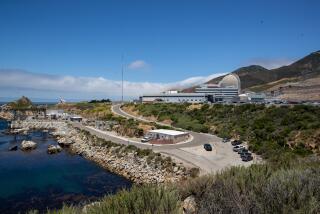Opponents of Seabrook Nuclear Plant Win Legal Skirmish
- Share via
WASHINGTON — Opponents of the Seabrook nuclear power plant won a preliminary legal battle Monday in their effort to raise financial issues as an obstacle to a full-power license for the New Hampshire facility.
A Nuclear Regulatory Commission licensing board ruled favorably on a request by Massachusetts Atty. Gen. James Shannon that the commission consider reviewing the financial stability of Public Service Co. of New Hampshire, the operator of Seabrook. Public Service Co. is bankrupt.
The Atomic Safety and Licensing Appeal Board said the commission may want to examine Public Service’s financial situation to assure that the utility has enough money to operate the plant safely and would not be tempted to take “safety shortcuts.”
The appeal board overturned an earlier decision by a lower commission licensing board that rejected Shannon’s request for a formal commission review of Public Service’s financial qualifications.
The appeal board’s decision means Shannon’s request will be forwarded to the NRC commissioners for a final decision.
Battle Already Long
If the commission decides to investigate Public Service’s financial status, Seabrook opponents will be allowed to present arguments on the issue to the commission. At the least, such proceedings would protract the already long battle over Public Service’s attempts to get an operating license for Seabrook.
Until now, the chief stumbling block has been the adequacy of the emergency evacuation plans for people living near the plant, which is in the southeastern portion of the state near the border with Massachusetts.
Massachusetts officials have opposed Seabrook’s operation, saying evacuations could not be done quickly enough should there be a radiation accident at the plant.
The commission does not ordinarily consider the financial stability of a utility in making a ruling on an operating license. That issue is usually addressed earlier in the licensing process, when the utility applies for a permit to build a nuclear plant.
If, however, the commission finds “special circumstances” under which a utility’s financial situation may be deemed to have an effect on safety considerations, it can reconsider the issue before deciding whether to issue an operating license.
Reasons for Action
The appeal board said Public Service’s decision to file for bankruptcy as well as New Hampshire laws restricting the utility revenues raised sufficient concern about safety to merit closer scrutiny of the utility’s financial situation.
The commission in December, 1988, granted a low-power testing license for Seabrook, authorizing the plant to operate at up to 5% of its capacity. In reaching that decision, the commission said low-power operations would pose little risk to the public and that there were no safety implications in Public Service’s financial difficulties.
The appeal board said that full-power operations would clearly pose a greater risk to the public and that, therefore, the commission should consider looking into whether Public Service’s being bankrupt might affect safety.
More to Read
Sign up for Essential California
The most important California stories and recommendations in your inbox every morning.
You may occasionally receive promotional content from the Los Angeles Times.










